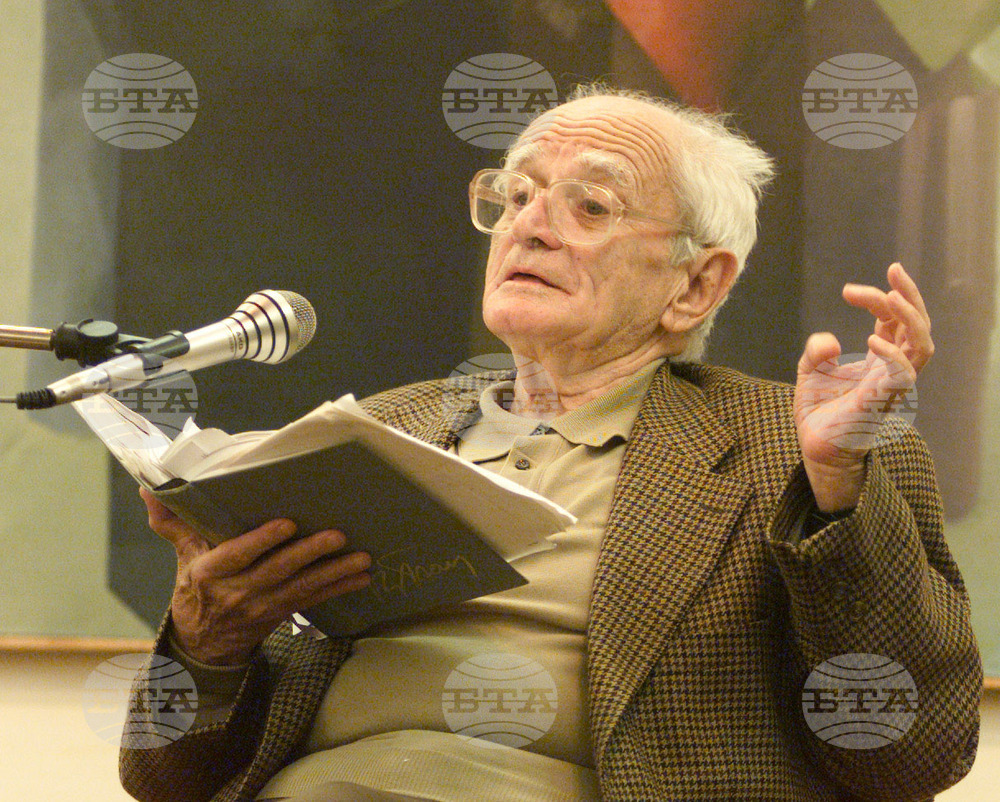site.btaValeri Petrov: A Poet at The Crossroads of Changes and Cultures


Valeri Petrov (22.4.1920-27.8.2014) is one of the best-known Bulgarian poets of our time. Poet, screenwriter, playwright, translator from several languages, and also – journalist, diplomatist, doctor, editor, political activist.
His contributions to various fields of national cultural life are still to be measured and evaluated. For he was prolific as an author and left behind an oeuvre including poems, scripts, children’s musicals, travelogues, public speeches at party meetings and in Parliament (he was an MP in the Seventh Grand National Assembly in 1990-1991).
Petrov authored many collections of poems. His plays are no less popular and loved and the scripts he has written have turned into some of the best known Bulgarian films. In 1997 he was awarded an Askeer - the Bulgarian annual theatre award - for lifetime achievements. His large collection of works for children has own him the reputation of the Writer with the Youngest Spirit.
He is the translator of the complete works of Shakespeare - all plays, sonnets and poems. He has also translated Gianni Rodari, Rudyard Kipling, Jacques Prevert, Aleksandr Blok, Boris Pasternak and Miklos Radnoti. His own early poems are translated by Joseph Brodsky.
Born Valery Nissim Mevorah in Sofia, he was the son of the prominent Jewish lawyer Nissim Mevorah, and Maria Petrova, a high-school French-language teacher. He studied as the Italian Lyceum in Sofia and then took a degree in medicine from Sofia University. Between 1947 and 1950 he worked in the Bulgarian legation in Rome as an attache in the press and culture department. During these years he travelled extensively to America, Switzerland and France as a delegate to various forums. Returning to Bulgaria, he was an editor at Boyana Film Studios and editor at the Bulgarian Writer Publishing House.
He was among the founders of the satirical paper "Sturshel" [Wasp].
He lived long enough to be influenced by three substantially different periods of Bulgarian public life: the Kingdom of Bulgaria, the Communist regime and post-1989 democracy.
Rift with party and switch to translation
Valery Petrov was a communist from his youth, and in 1944 he published “Naroden Sad” (People’s Court), a short play in verses praising the special court of Communist Bulgaria, established after the Bulgarian coup d'état of 1944 - and bitterly mocking its victims. Like many Bulgarian intellectuals of that time, he had problems with embracing all aspects of the official ideology of the regime. His mild criticism of the system was generally tolerated and made his name widely known throughout Bulgaria.
But in January 1971, he was expelled from the Communist Party along with several other writers after abstaining in a vote on a declaration by the Union of Bulgarian Writers against the award of the Nobel Prize to Aleksandr Solzhenitsyn. A report by the communist-era Committee for State Security (6th Department, which was in charge of combatting subversive and anti-state activity) about him said that he “criticized from unsound positions the line of the Bulgarian Communist Party in the field of literature and art; considered joint actions to ridicule and ironize some official manifestations on the cultural front”.
His rift with the party brought an unexpected bonus for literature: he turned to translation. As Petrov confessed in an interview with journalist Jordan Georgiev in 2008, “I felt I had gone out of favour. It was difficult to publish, and, on the other hand, I didn't feel like publishing poetry. (…) I am very hardworking, which is not a great advertisement for the poet's image – a poet is traditionally supposed to be bohemian, lazy, etc. I’m the other type. That's when I said to myself, ‘You can't do without work, you'll go crazy if you don't work.’ I turned to translation because I knew languages, to varying degrees – some well, some not so well. My Italian was the best. I've forgotten it now, but I used to speak like an Italian back then. The school I had attended, plus the four years in Rome, had helped me master it almost to perfection. (…) Other languages I knew to varying degrees - more for the purpose of reading than of speaking. English, with which the largest share of my translations is related, was one of my weakest languages.”
Today Valeri Petrov’s translations are seen by experts and the general public alike as a huge contribution to intercultural communication. He translated from English, German, Russian, Italian and Spanish, his translations from English being the best-known. No matter what he said of his English, his translation of the complete Shakespeare remains a feat in itself. Petrov’s mastery of Bulgarian was probably the leading element here, for Shakespearean era, characters, background details and dialogues are reflected in Bulgarian in a unique and picturesque way. Valery Petrov’s remarkable manner of writing - easily shifting to puns, operating with equivoques and changes of style, combining successfully the lyrical and the satirical - made Bulgarian-language Shakespeare real and meaningful.
There is also a non-linguistic issue of selection, or “choice”, to use his own words. In another interview, on Bulgarian National Radio, Petrov comments on the translator’s need to compromise between the literal meaning and the freedom of interpretation: “A translator turns into a critic and interpreter of his author, for he has to choose what in the text is the most precious, the most valuable, and what – being of high value too - is to be sacrificed and abandoned.”
To choose among various meanings and associations in the rich field of world classic heritage requires knowledge of life, moral compass, and wisdom, and in this choice Valery Petrov was very successful indeed.
/NF/
news.modal.header
news.modal.text